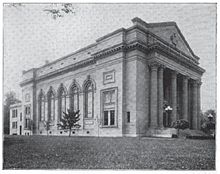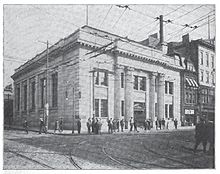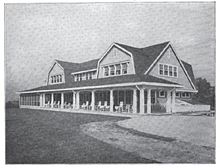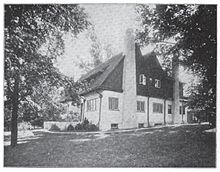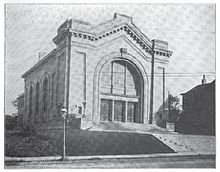- Rudolph Tietig
-
Rudolph Tietig (1877-1958) was an architect in Cincinnati, Ohio, United States and a partner in the Tietig & Lee architectural firm with William H. Lee (1877-1952).[1][2]
Contents
Background
He was born in Cincinnati to German parents.[1] His father came to Cincinnati at the age of 20 and was a cigar maker.[1] Tietig attended the Technical School of Cincinnati and Massachusetts Institute of Technology graduating in the class of 1898 with a bachelor of science degree.[1]
Career
Tietig worked in New York with Robert Maynicke and G.K. Thompson before returning to Cincinnati in 1903.[1] His firm employed Leonard B. Willeke as a designer for a "short time" and Leo Townsend (architect) for a period that included 1906 and 1913.
The firm designed the homes in the Avondale and Indian Hill sections of Cincinnati including those of "prominent citizens" such as Simon Kuhn, A.G. Brunsman, and A.H. Mitchell, "as well as factories and warehouses."[2] The firm worked with Garber & Woodward on some projects and competed with them for others.[2] The firm designed several schools in Arts & Crafts architecture and (later) in American Colonial Revival architecture styles.[2]
Tietig was president of American Institute of Architects Cincinnati Chapter, in 1913 while Walter L. Rapp was vice-president.[3]
The Sayler Park School, now Sayler Park Elementary, was designed by Tietig's firm built in 1930 for $377,860.[4] It was "touted as state of the art" at the time, and in 2010 is slated for an "estimated $12 million in additions and renovations as it celebrates its 80th birthday". The local school board decided to close the school in 2009, but later reversed itself and "opted for the renovations instead".[4] The school is scheduled to reopen for the 2012-2013 school year after updates and expansions that include "a new two-story addition, an elevator, new gym and updates to classrooms".[4]
Tietig designed the Ashkenazi Jewish Losantiville Country Club[5] and two synagogues, Temple K. K. Ben Israel (now Rockdale Temple) and Temple Sh'Brith Israel Ahabath Achim. [6][2] The congregation at Rockdale is one of the oldest west of the Allegheny Mountains.[7]
Projects
- Rudolph Tietig house[8]
- Losantiville Country Club
- Western German Bank [1] formerly in South East Cincinnati on 12th and Vine streets
- Fourteenth District School[1]
- Highland School[1]
- Hughes High School (Cincinnati) addition (original building designed by J. Walter Stevens of St. Paul, Minnesota) [2]
- Medical Arts Building (Memphis, Tennessee) [2]
- Doctors' Building on Garfield Place [2]
- Garfield Hotel, Cincinnati [2]
- Atlas National Bank Building (c.1922) on Walnut Street in Cincinnati [2] [9][10]
- Strand Theatre (Cincinnati) (1913), [2] demolished in 1950 to make way for the current Fountain Square location.[11]
- Plans for a five story addition to the one-story Diem & Wing Paper Co. Building on Eggleston Avenue.[12]
- Merchant's building, Cincinnati at 6th and College streets[1]
- Temple K K Ben Israel (Rockdale Temple), a Cincinnati synagogue in the neoclassical style,[citation needed] later demolished in favor of a contemporary style building)[1] on Rockdale Avenue in Avondale (illustrated by Montgomery Schuyler in 1908)[2]
- Engineering College of the University of Cincinnati[1]
- Jewish Synagogue Temple S.I.A.A. formerly on Reading Road in Avondale [2]
- "Over-the-Rhine", which either replaced or supplemented "one of Elzner's earliest works" [2]
- Cincinnati Tennis Club (1906) on Wold and Dexter Avenues in East Walnut Hills, listed on the National Register of Historic Places
- Stowe School [2]
- Sands School [2]
- Sayler Park School (1930) in Sayler Park[2]
- North side (Cumminsville) Public Library (1906).
- "Most" of the early 20th-century Cincinnati Bell Telephone suburban branch exchanges [2]
- Medical Arts Building and Garage 248 Madison Ave. and 11 N. 4th Street in Memphis, Tennessee, listed on the National Register of Historic Places
-
Engineering College building, University of Cincinnati
References
- ^ a b c d e f g h i j k Charles Frederic Goss Cincinnati, the Queen City, 1788-1912, Volume 4 S.J. Clarke Publishing Company Editor Charles Frederic Goss, The S. J. Clarke Publishing Company, 1912 Original from Harvard University Digitized Jan 24, 2008 pages 696-699
- ^ a b c d e f g h i j k l m n o p q r Walter E. Langsam Rudolph Tietig Biographical Dictionary of Cincinnati Architects, 1788-1940 Architectural Foundation of Cincinnati
- ^ Florence Nightingale Levy American art directory, Volume 10 American Federation of Arts, R.R. Bowker, 1913 Original from the University of Michigan Digitized Oct 24, 2005
- ^ a b c Heidi Fallon Sayler Park school planning to party in March January 28, 2010 Cincinnati Enquirer
- ^ Polk Laffoon IV Teed Off May 2009 Cincinnati Magazine
- ^ Ohio Architect and Builder, Volume 20 Published 1912 Original from the New York Public Library Digitized Jun 18, 2008 page 15-35 photos by G.M. Watson and Co.
- ^ James P. Wind, James Welborn Lewis [1] American Congregations: Portraits of twelve religious communities] Volume 1 of American Congregations, James Welborn Lewis Volume 1 of The Congregational History Project Series, Editors James P. Wind, James Welborn Lewis Edition illustrated Publisher University of Chicago Press, 1994 ISBN 0226901866, 9780226901862 719 pages page 160
- ^ Aymar Embury [2] One hundred country houses: modern American examples] page 213
- ^ Domestic engineering and the journal of mechanical contracting, Volume 99 June 17, 1922 page 555
- ^ slide of Atlas National Bank Building
- ^ Theatre Cinema Treasures
- ^ [3] Domestic engineering and the journal of mechanical contracting, Volume 89 page 654 1919
Categories:- 1877 births
- 1958 deaths
- Architects from Ohio
Wikimedia Foundation. 2010.

